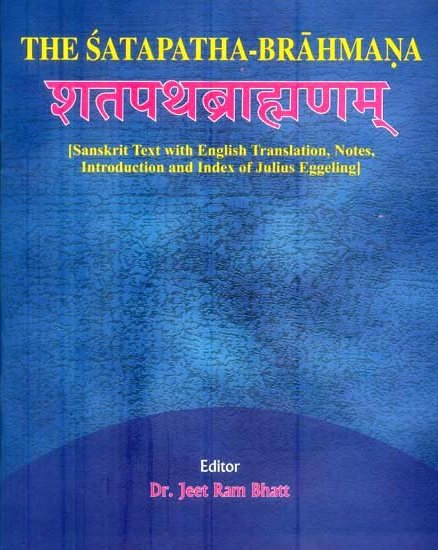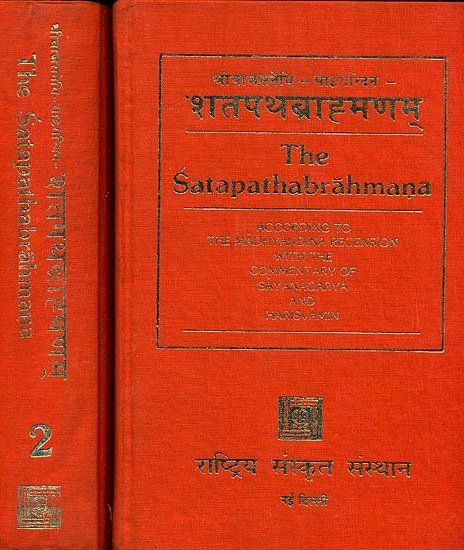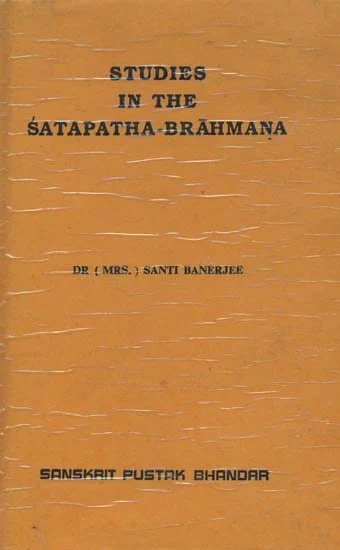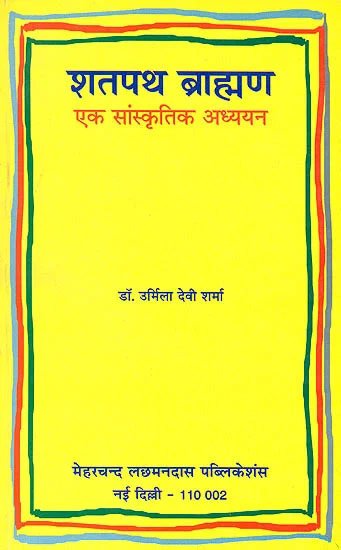Satapatha-brahmana [sanskrit]
147,532 words | ISBN-10: 812080113X | ISBN-13: 9788120801134
The Sanskrit text of the Satapatha-brahmana: One of the largest works in the category of Vedic (Brahmaic) literature, narrating in extensive detail the various rites, constructions, chants and utensils to be used in Hindu ceremonies. Alternative titles: Śatapathabrāhmaṇa (शतपथब्राह्मण), Śatapatha-brāhmaṇa (शतपथ-ब्राह्मण) Shatapathabrahma (shatapatha).
Verse 13.4.1.13
tasyai pañcadaśa sāmidhenyo bhavanti pañcadaśo vai vajro vīryaṃ vajro vajreṇaivaitadvīryeṇa yajamānaḥ purastātpāpmānamapahate vārtraghnāvājyabhāgau pāpmā vai vṛtraḥ pāpmano'pahatyā agnirmūrdhā divaḥ kakudbhuvo yajñasya rajasaśca netetyupāṃśu haviṣo yājyānuvākye mūrdhanvatyanyā bhavati sadvatyanyaiṣa vai mūrdhā ya eṣa tapatyetasyaivāvaruddhyā atha yatsadvatī sadevāvarunddhe virājau saṃyājye sarvadevatyaṃ vā etaccando yadvirāṭ sarve kāmā aśvamedhe sarvāndevānprītvā sarvānkāmānāpnavānīti hiraṇyaṃ dakṣiṇā suvarṇaṃ śatamānaṃ tasyoktam brāhmaṇam
Preview of English translation:
13. For this (offering) there are fifteen kindling-verses; for fifteenfold is the thunderbolt, and the thunderbolt means vigour: with the thunderbolt (of) vigour the Sacrificer thus from the first repels evil. The two butter-portions relate to the slaying of Vritra, with a view to the repelling of evil, for Vritra is evil. [The verses, Vajasaneyi Samhita XIII, 14, 15,] “Agni, the head, the summit of the sky . . .,” and 'Be thou the leader of the sacrifice and the realm of space (whither thou strivest with auspicious teams: thy light-winning head hast thou raised to the sky, and thy tongue, O Agni, hast thou made the bearer of the offering),' pronounced in a low voice, are the anuvakya and yajya of the chief oblation. The one contains (the word) “head,” the other (the verb) “to be,”—for the head, assuredly, is he that shines yonder: thus it is in order to secure him (the Sun); and as to why (the other) contains (the verb) “to be,”—he thereby secures that which is (the real, truly existent). The Samyajyas are two viraj-verses; for that—to wit, the Viraj—is the metre belonging to all the gods, and all objects of desire are (contained) in the Ashvamedha: “Having gratified all the gods, may I obtain all my desires!” so he thinks. The sacrificial fee is gold weighing a hundred (grains): the meaning of this has been explained.
For a detailled translation, including proper diacritics and footnotes, go the full English translation.
Other editions:
Also see the following editions of the Sanskrit text or (alternative) English translations of the Satapatha-brahmana Verse 13.4.1.13
The Satapatha Brahmana (In Five Volumes)
by Julius Eggeling (1882)
2551 pages; [Publisher: Motilal Banarsidass Publishers Pvt. Ltd.]
Buy now!
The Satapatha Brahmana (3 volumes)
by Dr Jeet Ram Bhatt (2009)
Sanskrit Text with English Translation; 1726 pages; [Publisher: Eastern Book Linkers]; ISBN: 9788178541693
Buy now!
The Satapatha Brahmana (With The Commentary of Sayanacarya and Harisvamin)
by Rashtriya Sanskrit Sansthan (2002)
3483 pages; [शतपथ ब्राह्मणम्] According to the Madhyandina Recension; Commetaries: (1) Vedarthaprakash (Vedartha-prakasha) by Shrimat-Trayibhashyakar Sayanacharya, (2) Sarvavidyanidhana Kavindracharya Saraswati.
Buy now!
Studies in the Satapatha-Brahmana
by Dr. (Mrs.) Santi Banerjee (1993)
236 pages; [Publisher: Sanskrit Pustak Bhandar]
Buy now!
Cultural Study of the Satapatha Brahman (in Hindi)
by Dr. Urmila Devi Sharma (1982)
106 pages; Shatapatha Brahmana Ek Sanskritik Adhyan; [Publisher: Meharchand Lakshmandas Publications]
Buy now!![Satapatha-brahmana [sanskrit] - book cover](/uploads/a/NAC457-Satapatha-Brahmana.jpg)



